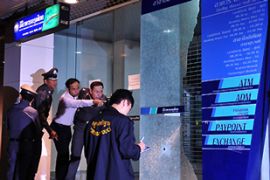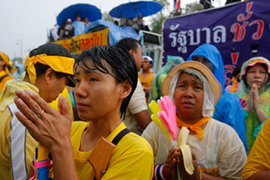Deadly violence rocks Thai capital
Two policemen are killed in attacks near anti-government protests in Bangkok.

Earlier, one policeman was killed and four others – two police and two civilians – were wounded when a man on a motorbike opened fire on a patrol in the nearby Silom financial district, which is under heavy guard.
The incident took place after midnight on Friday, in the Silom Road area popular with tourists, and struck a group of protesters that had gathered to voice their opposition to the so-called red shirts near a branch of Krung Thai Bank.
The same location was targeted in a grenade attack on April 22 that killed one person and wounded more than 80 others.
Friday’s incident threatened to raise tensions in the capital after a week of calm, as protesters led by the United Front for Democracy Against Dictatorship – popularly known as the “red shirts” – hinted they may be able to strike a deal in the coming days to end a deadly crisis that has killed 28 people and wounded more than 1,000.
The red shirts include followers of Thaksin Shinawatra, the deposed Thai prime minister, and others who oppose the 2006 military coup that toppled him.
Crippling standoff
Abhisit Vejjajiva, the current prime minister, has put forward a plan to end the rallies that have crippled the capital and scared off tourists,but it remained in limbo as rival factions squabbled over details, including a proposed early election in November.
| in depth | |||||||||||||||||||||||||
|
“We are not calling off protests as yet,” Jaran Ditapichai, a leader of the red shirts, told the Reuters news agency after meeting fellow leaders.
“We have a proposal for Abhisit and we will talk about it in more detail later.”
The standoff has paralysed the commercial heart of the capital for nearly two months.
A state of emergency has been in force in Bangkok since April 7 and thousands of troops and riot police surround the red shirts encampment.
The tensions caused Thai stocks to fall 2.1 per cent on Friday, but other Asian markets were also in negative territory.
Thai stocks have given up gains scored on Tuesday, when the index jumped 4.4 per cent in reaction to Abhisit’s reconciliation plan.
Abhisit offered to dissolve parliament in the second half of September ahead of an election on November 14 as part of a plan to end the crisis.
But that failed to convince the mostly rural and urban poor red shirt protesters who have refused to move from the commercial district, where upscale malls and luxury hotels have been forced to close their doors since April 3.
Market losses
A local business group put revenue losses in the area since April 3 at about $5.4 million a day.
At least 10,000 protesters rallied on Friday night at the heavily barricaded camp of an upmarket commercial district in central Bangkok.
 |
| The yellow shirts condemn the government’s plan to dissolve parliament [GALLO/GETTY] |
Abhisit also faces some opposition from the government’s traditional supporters after the yellow shirt group, which broadly represents the anti-Thaksin royalist elite
and the middle classes, condemned his plan.
The yellow shirts, whose eight-day occupation of Bangkok’s airport in 2008 helped undermine a Thaksin-allied government, said Abhisit should resign if he cannot enforce the law and end the occupation of the shopping district.
The red shirts, who had demanded immediate elections when their latest protest rally started in mid-March, say the ruling coalition lacks a popular mandate after coming to power in a controversial parliamentary vote 17 months ago.
Protest leaders are demanding a specific date for dissolution of parliament – an issue analysts said was probably an excuse to negotiate a better deal.
